Mises, Ludwig von. Human Action: A Treatise on Economics
Подождите немного. Документ загружается.

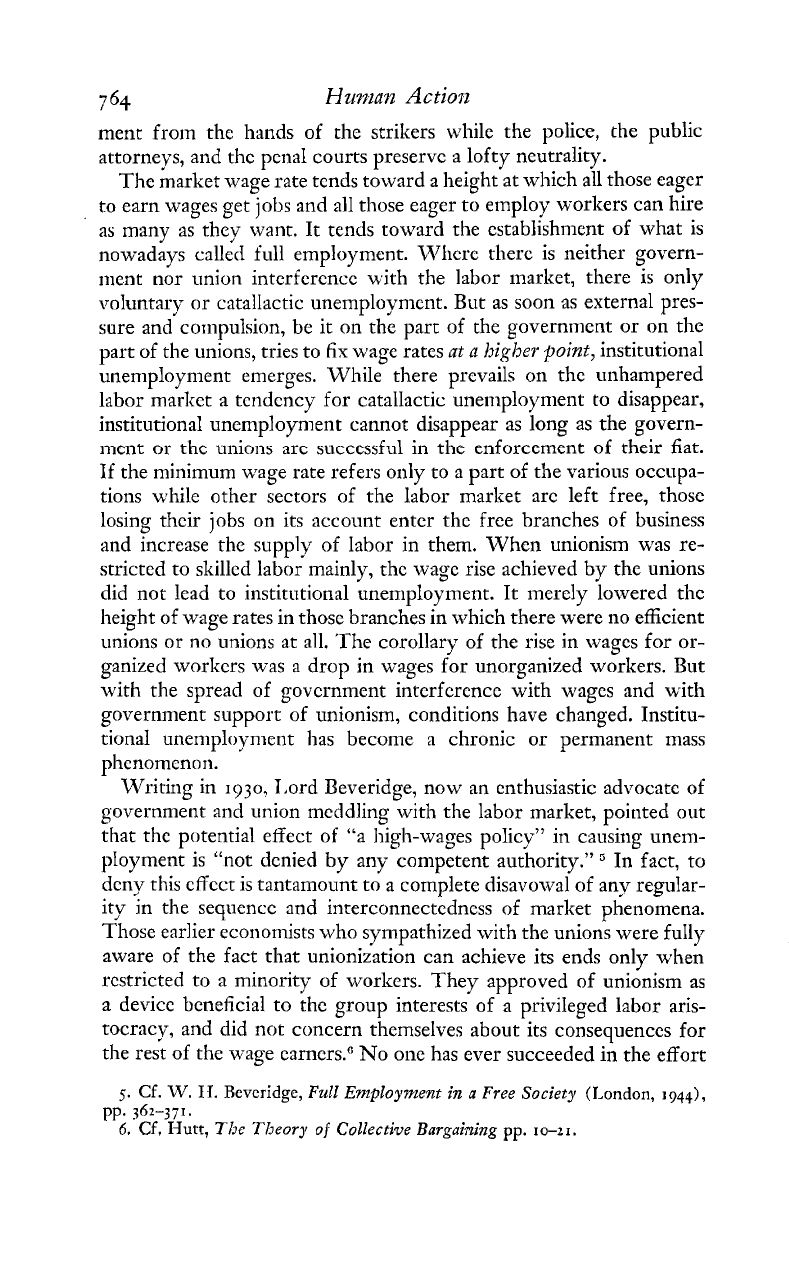
764
Human
Action
ment from the hands of the strikers while the police, the public
attorneys, and the penal courts preserve a lofty neutrality.
The market wage rate tends toward a height at which all those eager
to earn wages get jobs and all those eager to employ workers can hire
as many as they want. It tends toward the cstablishnlent of what is
nowadays called full employment. Whcrc there is neither govern-
ment nor union interfercncc with the lal~or market, there is only
voluntary or catallactic unemployment. But as soon as external pres-
sure and cornpulsion, be it on the part of the government or on the
part of the unions, tries to
fix
wage rates
at
a
higher
point,
institutional
unemployment emerges. While there prcvails on the unhampered
labor market a tcndcncy for catallactic unemployment to disappear,
institutional unemployment cannot disappear as long as the govern-
ment or the unions arc successful in the enforcement of their fiat.
If the minimum wage rate refers only to a part of the various occupa-
tions while other sectors of the labor market arc left free, those
losing thcir jobs on its account enter the free branches of business
and increase the supply of labor in them. When unionism was re-
stricted to skilled labop mainly, the wage rise achieved by the unions
did not lead to institutional unemployment. It merely lowered the
height
of
wage rates in those branches in which there were no efficient
unions or no unions at all. 'The corollary of the rise in wages for or-
ganized workers was a drop in wages for unorganized workers. But
with the spread of govcrnment intcrfcrcnce with wages and with
government support of unionism, conditions have changed. Institu-
tional unenlployment has become a chronic or permanent mass
phenomcnon.
Writing in 1930. T,ord Beveridge, now an enthusiastic advocate of
government and union mccldling with the labor market, pointed out
that the potential effect of "a high-wages policy" in causing unem-
pIoyment is "not dcnied by any competent authority." "n fact, to
denv this cffcct is tantamount to a complete disavowal of any regular-
ity ;n the sequence and interconnectcdncss of market phenomena.
Those earlier economists who sympathized with the unions were fully
aware of the fact that unionization can achieve its ends only when
rcstricted to a minority of worlters. They approved of unionism as
a device bcneficial to the group interests of a privileged labor aris-
tocracv, and did not concern thcrnselves about its consequences for
the rest of the wage ~arncrs.~ No onc has ever succeeded in the effort
5.
Cf.
W.
11.
Revcridgc,
Full Enzplogment in
a
Free Society
(London,
194~1,
pp.
362-37'.
6.
Cf,
Hutt,
The Theory
of
Collective Bargaining
pp.
IC-21.
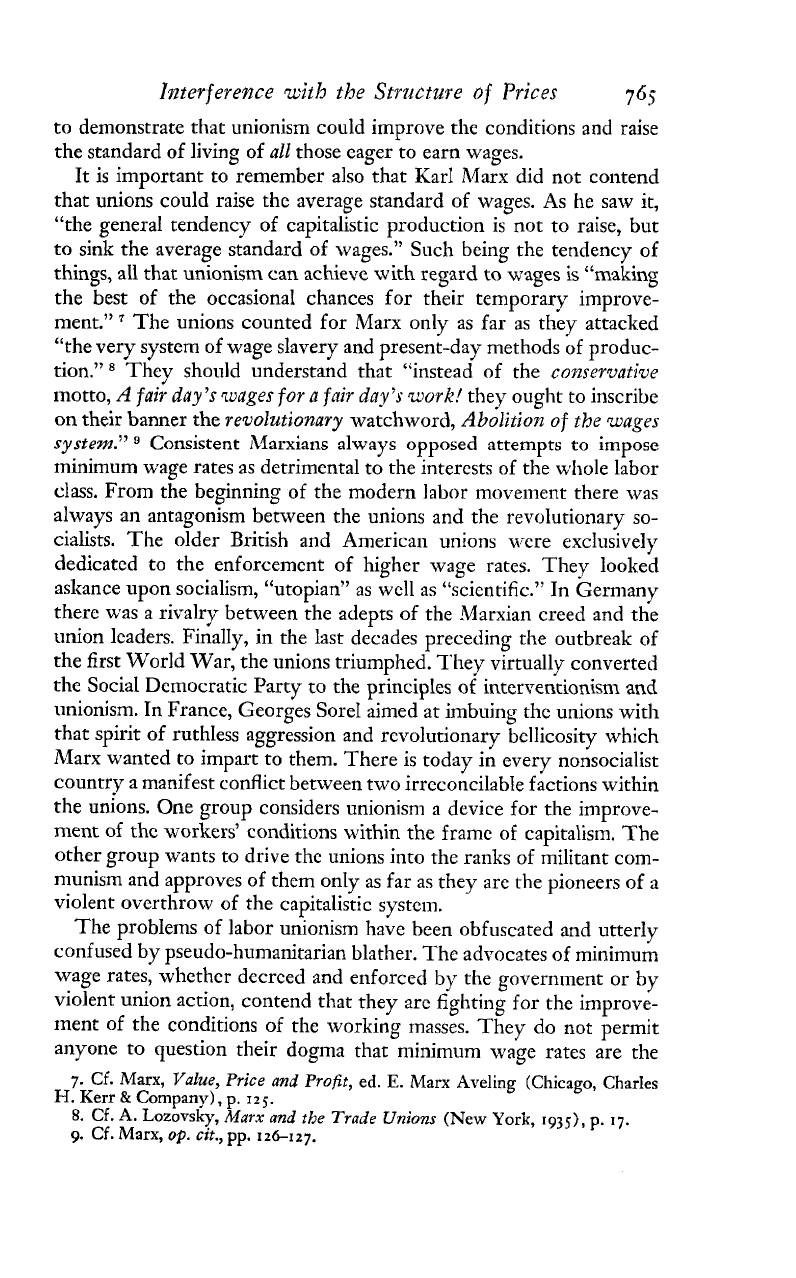
Interference
with
the St~z~ct~re
of
Prices
765
to demonstrate that unionism could improve the conditions and raise
the standard of living of
all
those eager to earn wages.
It is important to remember also that Karl Marx did not contend
that unions could raise the average standard of wages. As he saw it,
"the general tendency of capitalistic production is not to raise, but
to sink the average standard of wages." Such being the tendency of
things, all that unionism can achieve with regard to wages
is
"making
the best of the occasional chances for their temporary improve-
ment."
*
The unions counted for Marx only as far as they attacked
"the very system of wage slavery and present-day methods of produc-
tion."
*
They should understand that "instead of the
conservative
motto,
A
fair day's wages for
n
fair day's work!
they ought to inscribe
on their banner the
revolutionary
watchword,
~bdlition
of
the
wages
system."
Tonsistent Marxiam always opposed atrempts to impose
minimum wage rates as detrimental to the interests of the whole labor
class. From the beginning of the modern labor movement there was
always an antagonism between the unions and the revolutionary so-
cialists. The older British and American unions were exclusively
dedicated to the enforcement of higher wage rates. They looked
askance upon socialism, "utopian" as
well
as "scientific." In ~errnan~
there was a rivalry between the adepts of the Marxian creed and the
union leaders. Finally, in the last decades preceding the outbreak of
the first World War, the uniom triumphed. They virtually converted
the Social Democratic Party to the principles of interventionism
and
unionism. In France, Georges Sore1 aimed at imbuing the unions with
that spirit of ruthless aggression and revolutionary bellicosity which
hlarx wanted to impart to them. There is today in every nonsocialist
country a manifest conflict between two irreconcilabIe factions within
the unions. One group considers unionism a device for the improve-
ment of the workers' conditions within the frame of capitalism. The
other group wants to drive the unions into the ranks of militant com-
munism and approves of them only as far as they are the pioneers of a
violent overthrow of the capitalistic system.
The problems of labor unionism have been obfuscated and utterly
confused by pseudo-humanitarian blather. The advocates of minimum
wage rates, whether decreed and enforced by the government or by
violent union action, contend that they are fighting for the improve-
ment of the conditions of the working masses. They do not permit
anyone to question their dogma that minimum wage rates are the
7.
Cf.
Marx,
Value,
Price
and
Profit,
ed.
E.
Marx hveling (Chicago, Charles
H.
Kerr
&
Company), p. 125.
8.
Cf.
A.
Lozovsky,
Marx
and
the Trade
Unions
(New
York,
rg35),
p.
17.
9,
Cf.
Marx,
op.
cit.,
pp.
126127.
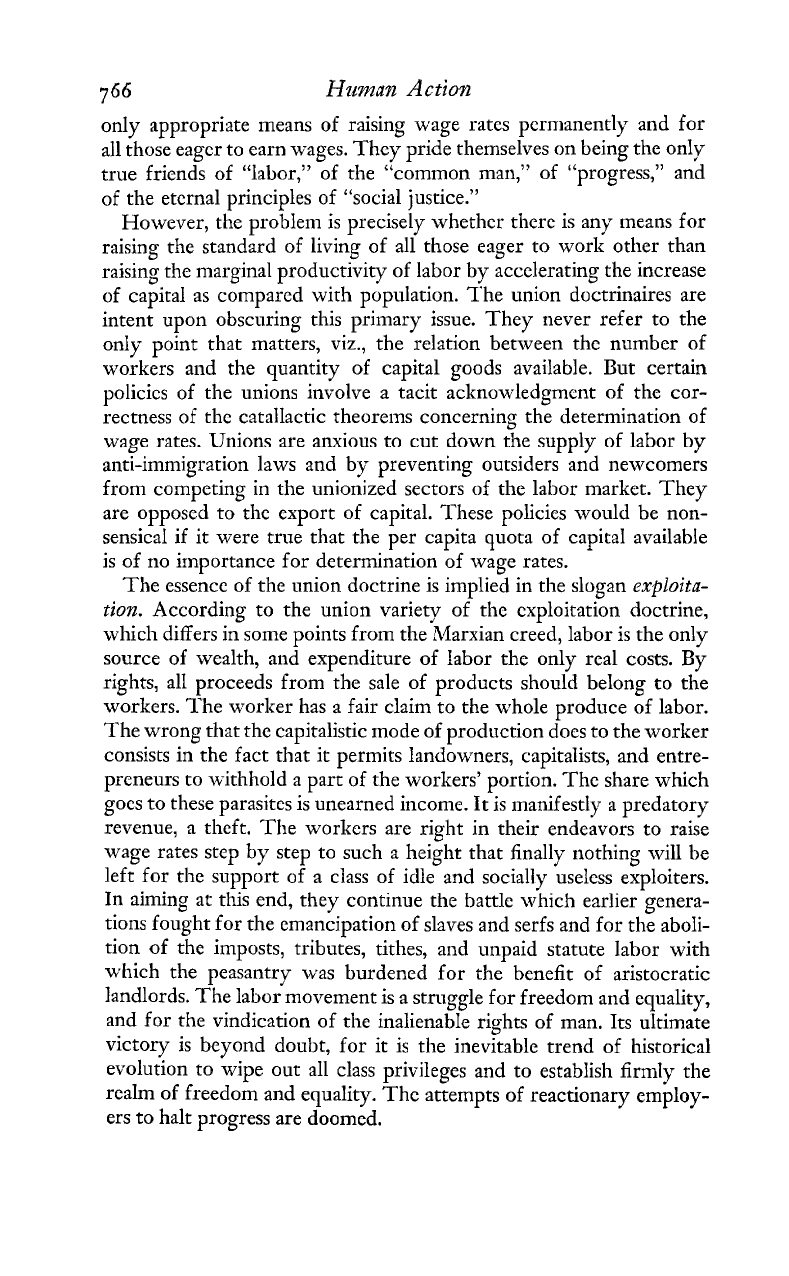
766
Human
Action
only appropriate means of raising wage rates permanently and for
all those eager to earn wages. They pride themselves on being the only
true friends of "labor," of the "common man," of "progress," and
of the eternal principles of "social justice."
However, the problem is precisely whether there is any means for
raising the standard of living of all those eager to work other than
raising the marginal productivity of labor by accelerating the increase
of capital as compared with population. The union doctrinaires are
intent upon obscuring this primary issue. They never refer to the
only point that matters, viz., the relation between the number of
workers and the quantity of capital goods available. But certain
policies of the unions involve a tacit acltnow-ledgmcnt of the cor-
rectness of the catallactic theorems concerning the determination of
wage rates. Unions are anxious to cut down the supply of labor by
anti-immigration laws and by preventing outsiders and newcomers
from competing in the unionized sectors of the labor market. They
are opposed to the export of capital. These policies would be non-
sensicaI if it were true that the per capita quota of capital available
is of no importance for determination of wage rates.
The essence of the union doctrine is implied in the slogan exploita-
tion. According to the union variety of the exploitation doctrine,
which differs in some points from the Marxian creed, labor is the only
source of wealth, and expenditure of labor the only real costs. By
rights, all proceeds from the sale of products should belong to the
workers. The worker has a fair claim to the whole produce of labor.
The wrong that the capitalistic mode of production does to the worker
consists in the fact that it permits landowners, capitalists, and entre-
preneurs to withhold a part of the workers' portion. The share which
goes to these parasites is unearned income. It is manifestly
a
predatory
revenue, a theft. The workers are right in their endeavors to raise
wage rates step
by
step to such a height that finally nothing will be
left for the support of a class of idle and socially useless exploiters.
in aiming at this end, they continue the battie whlch earlier genera-
tions fought for the emancipation of slaves and serfs and for the aboli-
tion of the imposts, tributes, tithes, and unpaid statute labor with
which the peasantry was burdened for the benefit of aristocratic
landlords. The labor movement is a struggle for freedom and equality,
and for the vindication of the inalienable rights of man. Its ultimate
victory is beyond doubt, for it is the inevitable trend of historical
evolution to wipe out all class privileges and to establish firmly the
realm of freedom and equality. The attempts of reactionary employ-
ers to halt progress are doomed.
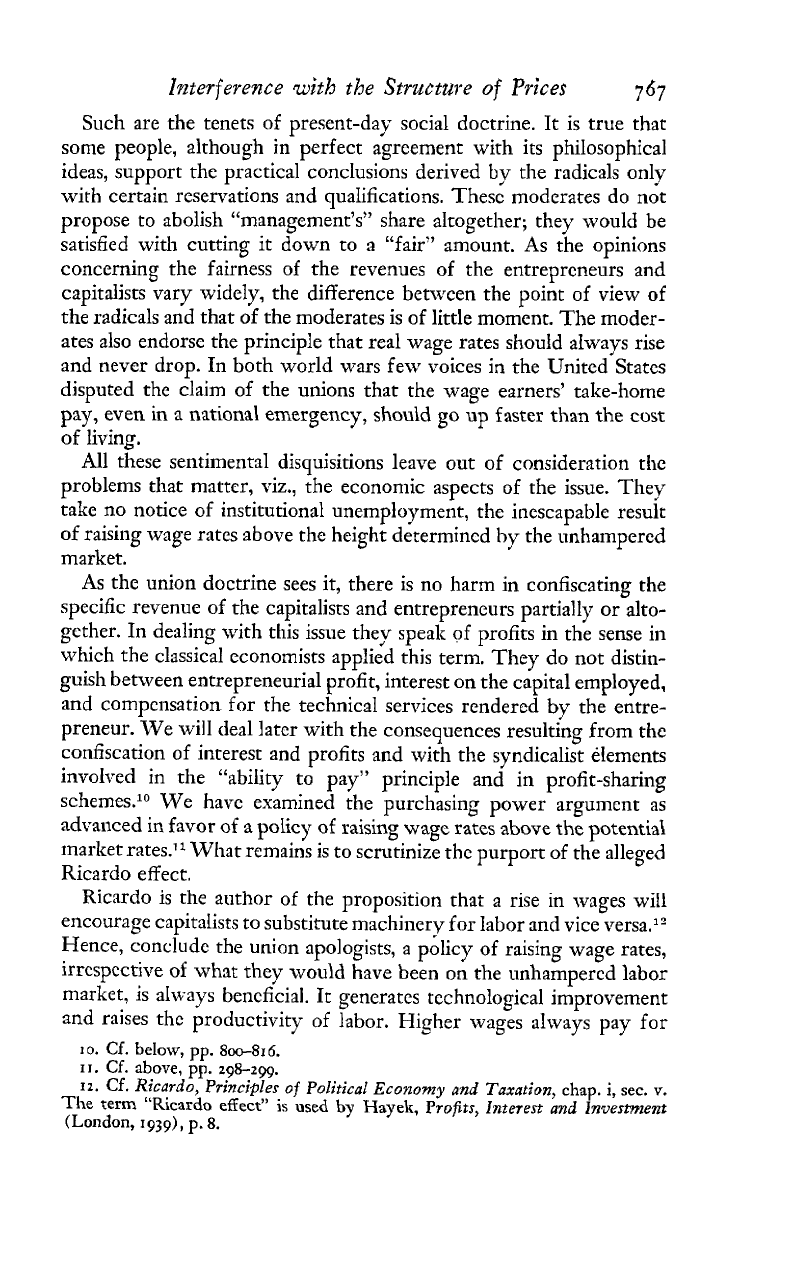
Interference with the Swucture
of
Prices
767
Such are the tenets of present-day social doctrine. It is true that
some people, although in perfect agreement with its philosophical
ideas, support the practical conclusions derived by the radicals only
wirh certain reservations and qualifications. Thesc moderates do not
propose to abolish "management's" share alcogcther; they would be
satisfied with cutting it down to
a
"fair" amount. As the opinions
concerning the fairness of the revenues of the entreprcneurs and
capitalists vary widely, the difference betwcen the point of view of
the radicals and that of the moderates is of little moment. The moder-
ates also endorse the principle that real wage rates should always rise
and never drop. In both world wars few voices in the United Statcs
disputed the claim of the unions that the wage earners' take-home
pay, even in
a
national emergency, should go
up
faster than
the
cost
of living.
All these sentimental disquisitions leave out of consideration the
problems that mattcr, viz., the economic aspects of the issue. They
take no notice of institutional unemployment, the inescapable result
of raising wage rates above the height determincd by the unhampercd
market.
As the union doctrine sees it, there is no harm in confiscating the
specific revenue of the capitalists and entrepreneurs partially or alto-
gether. In dealing with this issue they speak of profits in the sense in
which the classical economists applied this term. They do not distin-
guish between entrepreneurial profit, interest on the capital employed,
and compensation for the technical services rendered
by
the entre-
preneur. We will deal later with the consequences resulthg from the
confiscation of interest and profits and with the syndicalist elements
involved in the "ability to pay" principle and in profit-sharing
schemes.1° We have examined the purchasing power argument as
advanced in favor of
a
policy
of
raising
wage
rates above the potential
market rates.ll What remains is to scrutinize thc purport
of
the alleged
Ricardo effect.
Ricardo is the author of the proposition that
a
rise in wages wiIl
encourage capitalists to substitute machinery for labor and vice versa.'"
Hence, concludc the union apologists, a of raising wage rates,
irrespective of what thcy would have been on the unhampercd labor
market, is always beneficial. It gencratcs
technological
improvement
and raises thc productivity of labor. Higher wages always pay for
I
o.
Cf.
below,
pp.
800-816.
I
I.
Cf.
above,
pp.
298-299.
12.
Cf.
Ricardo, Principles of Political Economy
and
Taxation,
chap.
i,
sec.
V.
The
term "Ricardo
effect"
is
used
by
Hayek,
Profits, lnterest and Investment
(London,
1939),
p.
8.
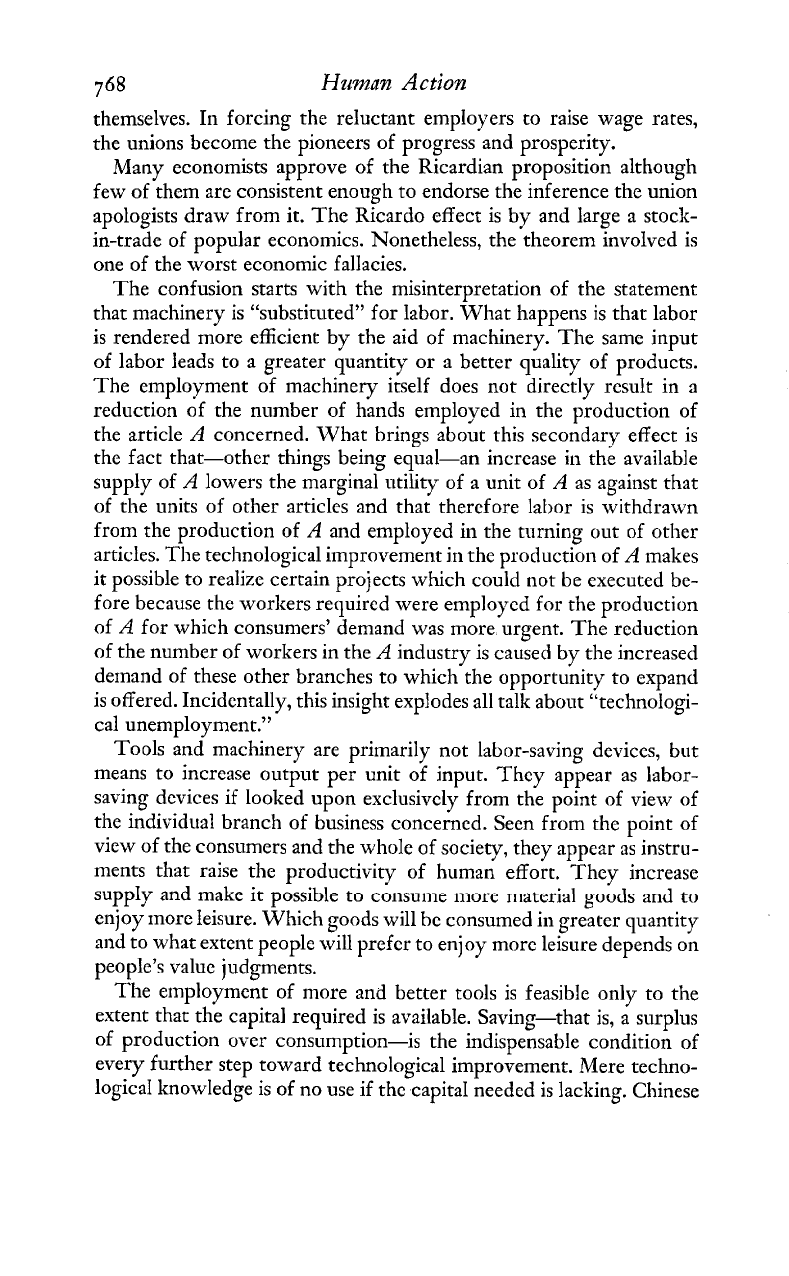
768
Hzcwzan
Action
themselves. In forcing the reluctant employers to raise wage rates,
the unions become the pioneers
of
progress and prosperity.
Many economists approve of the Ricardian proposition although
few of them are consistent enough to endorse the inference the union
apologists draw from it. The Ricardo effect is by and large
a
stock-
in-trade of popular economics. Nonetheless, the theorem involved is
one of the worst economic fallacies.
The confusion starts with the misinterpretation of the statement
that machinery is "substituted" for labor. What happens is that labor
is rendered more efficient by the aid of machinery. The same input
of labor leads to a greater quantity or a better quality of products.
The employment of machinery itself does not directly result in a
reduction
df
the number of hands employed in the production of
the article
A
concerned. What brings about this secondary effect is
the fact that-other things being equal-an increase in the available
supply of
A
lowers the marginal utility of a unit of
A
as against that
of the units of other articles and that therefore labor is withdrawn
from the production of
A
and employed in the turning out of other
articles. The technological improvement
in
the production of
A
makes
it possible to realize certain projects which could not be executed be-
fore because the workers required were employed for the production
of
A
for which consumers7 demand was more urgent. The reduction
of the number of workers in the
A
industry is caused by the increased
demand of these other branches to which the opportunity to expand
is offered. Incidentally, this insight explodes all talk about "technologi-
cal unemployment."
Tools and machinery are primarily not labor-saving devices, but
means to increase output per unit of input. They appear as labor-
saving devices if looked upon exclusivcly from the point of view of
the individual branch of business concerned. Seen from the point of
view of the consumers and the whole of society, they appear as instru-
ments that raise the productivity of human effort. They increase
supp!j.
aiid
make
it
possible to comiiiiie more n~atclrial
and
to
enjoy more leisure. Which goods will
bc
consumed in greater quantity
and to what extent people will prefer to enjoy more leisure depends on
people's value judgments.
The employment of more and better tools is feasible only to the
extent that the capital required is available. Saving-that is, a surplus
of production over consumption-is the indispensable condition of
every further step toward technological improvement. Mere techno-
logicaI knowledge is of no use if the capita1 needed is lacking. Chinese
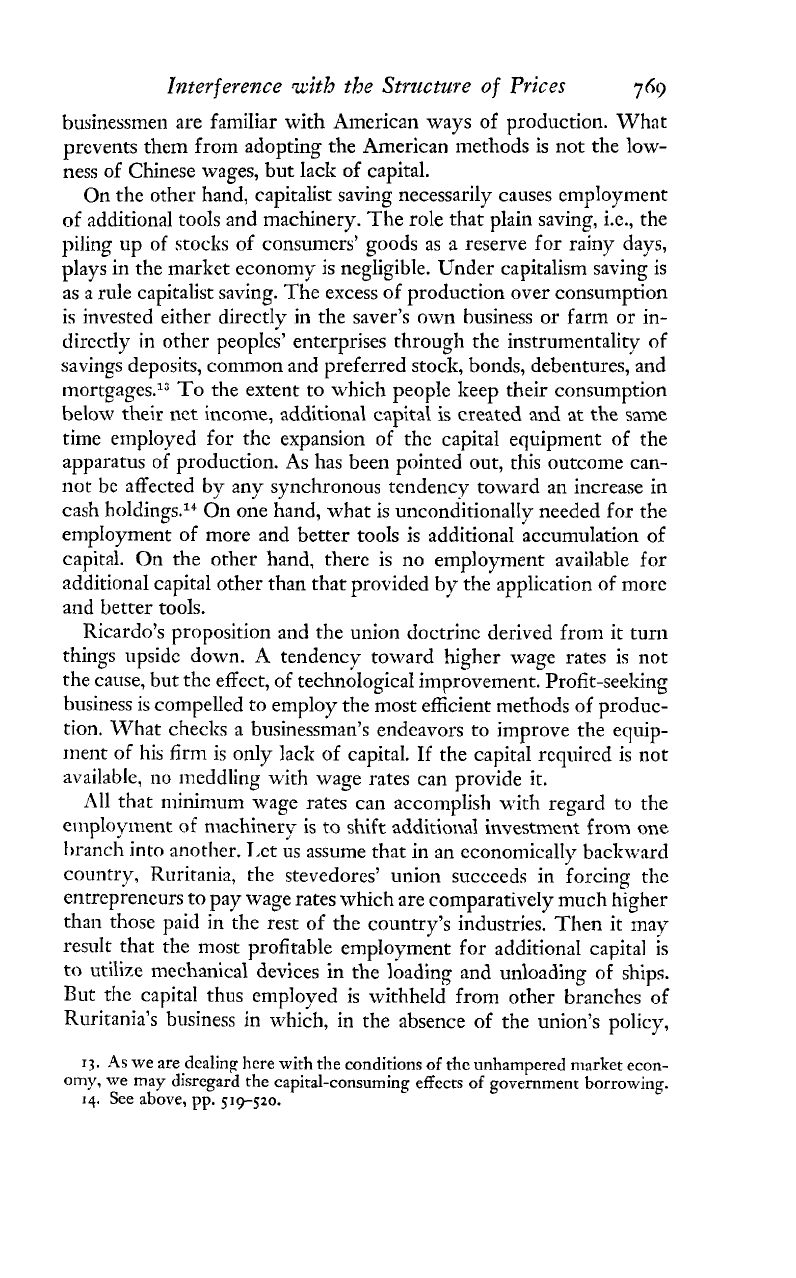
Interference mitt3 the Structure of Prices
businessmen are familiar with American ways of production. What
prevents them from adopting the American mcthods is not the
low-
ness of Chinese wages, but lack of capital.
On
the other hand, capitalist saving necessarily causes
employment
of additional tools and machinery. The role that plain saving, i.e., the
piling up of stocks of consumers' goods as
a
reserve for rainy days,
plays in the market economy is negligible. Under capitalism saving is
as a rule capitalist saving. The excess of production over consumption
is invested either directly in the saver's own business or farm or in-
directly in othcr ~eo~lcs' enterprises through the instrumentality of
savings deposits, common and preferred stock, bonds, debentures, and
mortgages.'To the extent to which people keep their consumption
below their net income, additional capital is created and at the same
timc crnploved for thc expansion of the capital equipment of the
apparatus of production. As has been pointed out, this outcome can-
not be affected
by
any synchronous tendency toward an increase in
cash holdings.14 On one hand, what is unconditionally needed for the
employment of more and better tools is additional accumulation
of
capital. On the other hand, there is no employment available for
additional capital other than that provided
by
the application
of
more
and better tools.
Ricardo's proposition and the union doctrinc derived from it turn
things upside down.
A
tendency toward higher wage rates is not
the cause, but thc effect, of technological improvement. Profit-seeking
business is compelled to employ the most efficient methods of produc-
tion. What checks a businessman's endeavors to improve the equip-
ment of his firm is only lack of capital.
If
the capital rcquired is not
available, no meddling with wage rates can provide it.
All that minimum wage rates can accomplish with regard to the
einployment of machinery is
to
shift additional investment from one
hranch into another. T,et us assume that in an cconornically backward
country, Ruritania, the stevedores' union succeeds in forcing the
entrcprencurs to pay wage rates which are comparatively much higher
than those paid in the rest of the country's industries. Then it may
result that the most profitable employment for additional capital is
to utilize mechanical devices in the 1bading and unloading of
ships.
But the capital thus employed is withheld from other branchcs of
Ruritania's business in which, in the absence of the union's policy,
13.
.4s
we
are dealing here
with
the conditions of the unhampered market econ-
omy,
we
may
disregard the capital-consuming effects of government borrowing.
14.
See above,
pp.
51y520.
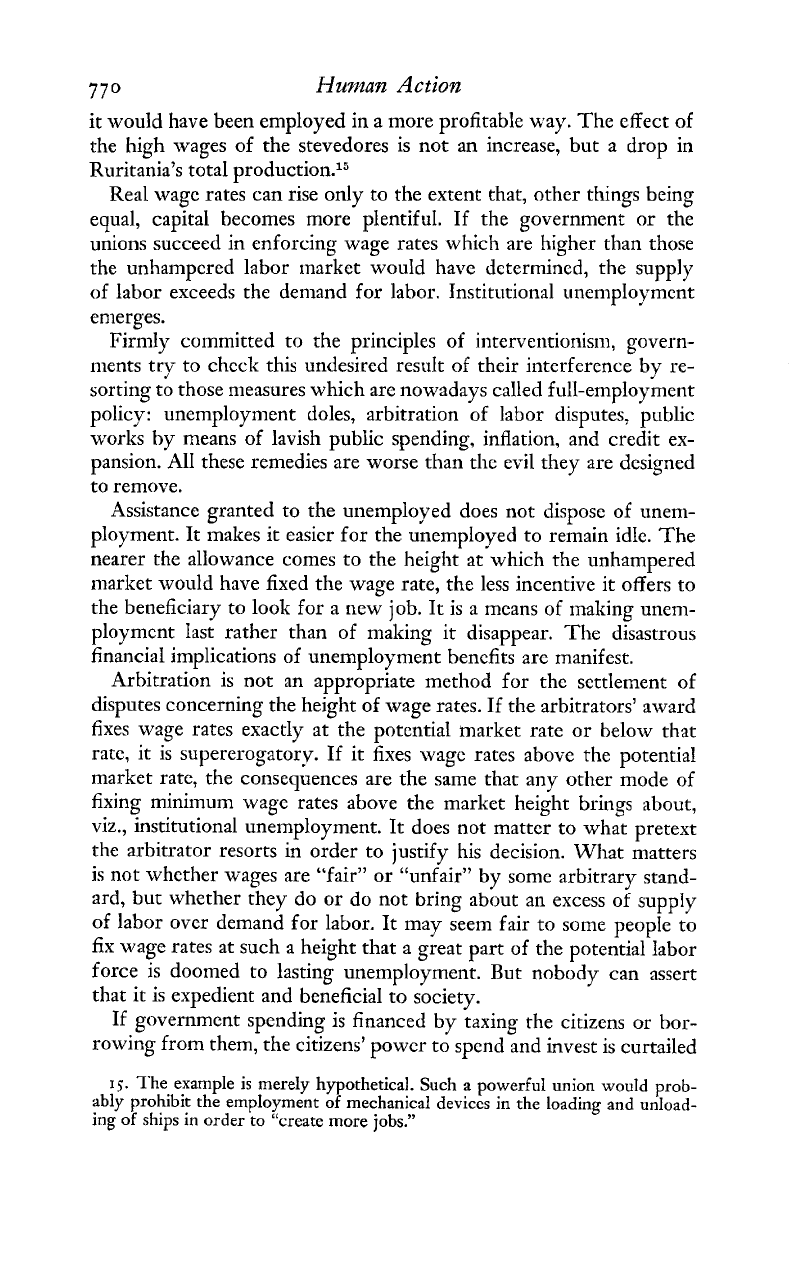
770
Human
Action
it would have been employed in a more profitable way. The effect of
the high wages of the stevedores is not
an
increase, but
a
drop in
Ruritania's total production.'"
Real wage rates can rise only to the extent that, other things being
equal, capital becomes more plentiful. If the government or the
unions succeed in enforcing wage rates which are higher than those
the unhampered labor market would have determined, the supply
of labor exceeds the denland for labor. Institutional unen~ployment
emerges.
Firmly committed to the principles of interventionism, govern-
ments try to check this undesired resuIt of their interference by re-
sorting to those measures which arc nowadays called full-ernploymcnt
policy: unemployment doles, arbitration of labor disputes: public
worlts by means of lavish public spending, inflation, and credit ex-
pansion. A11 these remedies are worse than the evil they are designed
to remove.
Assistance granted to the unemployed does not dispose of unem-
ployment. It makes it easier for the unemployed to remain idle. The
nearer the allowance comes to the height at which the unhampered
markct would have fixed the wage rate, the less incentive it offers to
the beneficiary to look for a new job. It is a means of making unem-
ployment last rather than of malting it disappear. The disastrous
financial implications of unemployment benefits are manifest.
Arbitration is not
an
appropriate method for the settlement of
disputes concerning the height of wage rates. If the arbitrators' award
fixes wage rates exactly at the potential market rate or below that
rate, it is supererogatorv. If it fixes wage ratcs above the potential
market rate, the conseq;ences are the same that any other mode of
fixing minimum wagc rates above the market height brings about,
viz., institutional unemployment. It does not matter to what pretext
the arbitrator resorts in order to justify his decision. What matters
is not whether wages are "fair" or "unfair" by some arbitrary stand-
ard, but whether they do or do not bring about an excess of suppi?
of labor over demand for labor. It may seem fair to some people to
fix wage rates at such a height that a great part of the potential labor
force is doomed to lasting unemployment. But nobody can assert
that it is expedient and beneficial to society.
If government spending is financed by taxing the citizens or bor-
rowing from them, the citizens' power to spend and invest is curtailed
15.
The example
is
merely hypothetical. Such
a
powerful union would prob-
ably prohibit the employment
of
mechanical deviccs in the loading and unload-
ing of ships
in
order to "create more jobs."
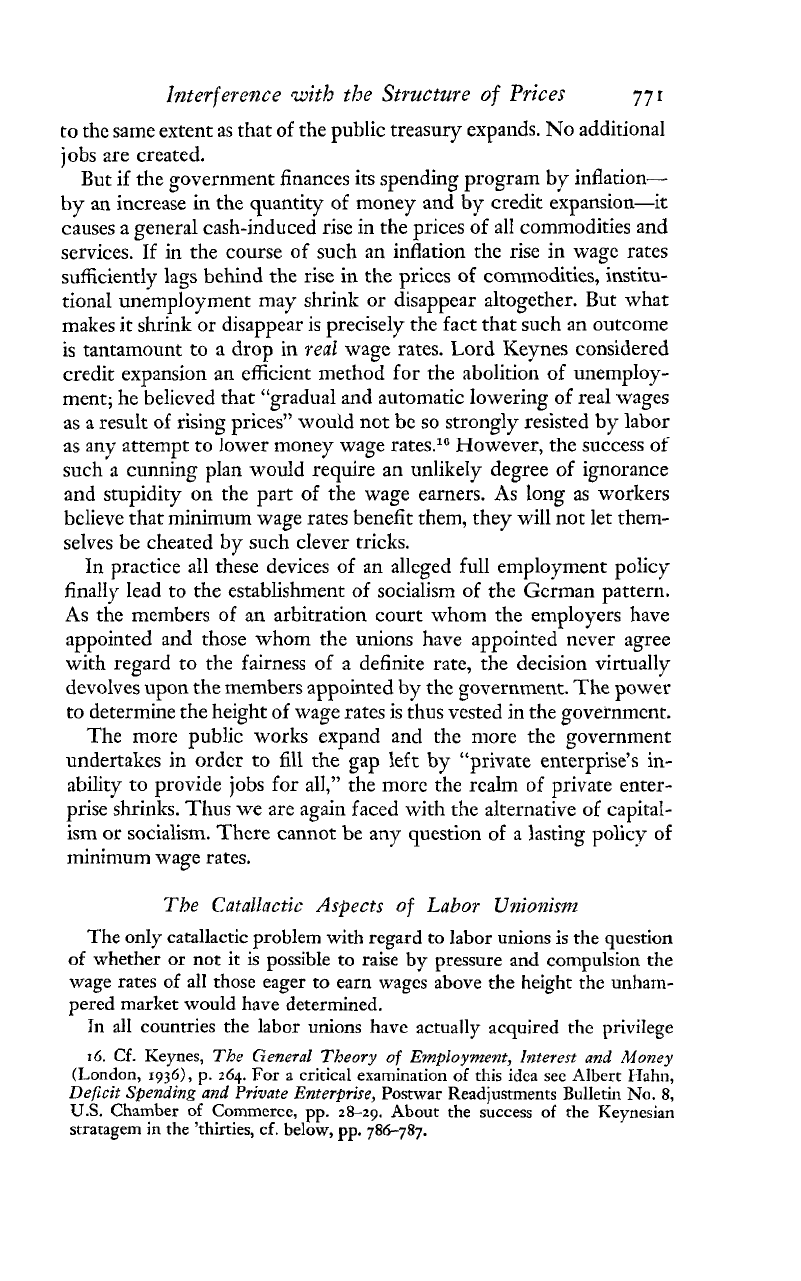
lnte~ference
with
the Structure
of
Prices
771
to the same extent as that of the public treasury expands. No additional
jobs are created.
But if the government finances its spending program by inflation-
by an increase in the quantity of money and by credit expansion-it:
causes a general cash-induced rise in the prices of all commodities and
services. If in the course of such an inflation the rise in wage rates
sufficientiy lags behind the rise
in
the prices
of
commodities, institu-
tional unemployment may shrink or disappear altogether. But what
makes it shrink or disappear is precisely the fact that such an outcome
is tantamount to a drop in
real
wage rates. Lord Keynes considered
credit expansion an efficient method for the abolition of unemploy-
ment; he believed that "gradual and automatic lowering of real wages
as a result of rising prices" would not be so strongly resisted by labor
as any attempt to lower money wage rates.l0 However, the success of
such a cunning plan would require an unlikeIy degree of ignorance
and stupidity on the part of the wage earners. As long as workers
believe that minimum wage rates benefit them, they will not let them-
selves be cheated by such clever tricks.
In practice all these devices of an alleged full employment policy
finally lead to the establishment of socialism of the German pattern.
As the members of an arbitration court whom the employers have
appointed and those whom the unions have appointed never agree
with regard to the fairness of a definite rate, the decision virtually
devolves upon the members appointed by the government. The power
to determine the height of wage rates is thus vested in the government.
The more public works expand and the more the government
undertakes in order to
fill
the gap left by "private enterprise's in-
ability to provide jobs for all," the more the realm
of
private enter-
prise shrinks. Thus we are again faced with the alternative of capital-
ism or socialism. There cannot be any question of a lasting policy of
minimum wage rates.
The Catalloctic Aspects
of
Labor
Unionism
The only catallactic problem with regard to labor unions is the question
of whether or not it is possible to raise
by
pressure and compulsion the
wage rates
of
a11 those eager
to
earn wages above the height the unham-
pered market would have determined.
In
all countries the labor unions have actually acquired the privilege
16.
Cf.
Keynes,
The General Theory of Employment, Interest and Money
(London,
r936),
p.
264.
For a critical examination of this idea see Albert IIahn,
Deficit
Spending and Private Enterprise,
Postwar Readjustments Bulletin
No.
8,
U.S.
Chamber
of Commerce,
pp.
28-29.
About the success of the Keynesian
stratagem in the 'thirties,
cf.
below,
pp.
786-787.
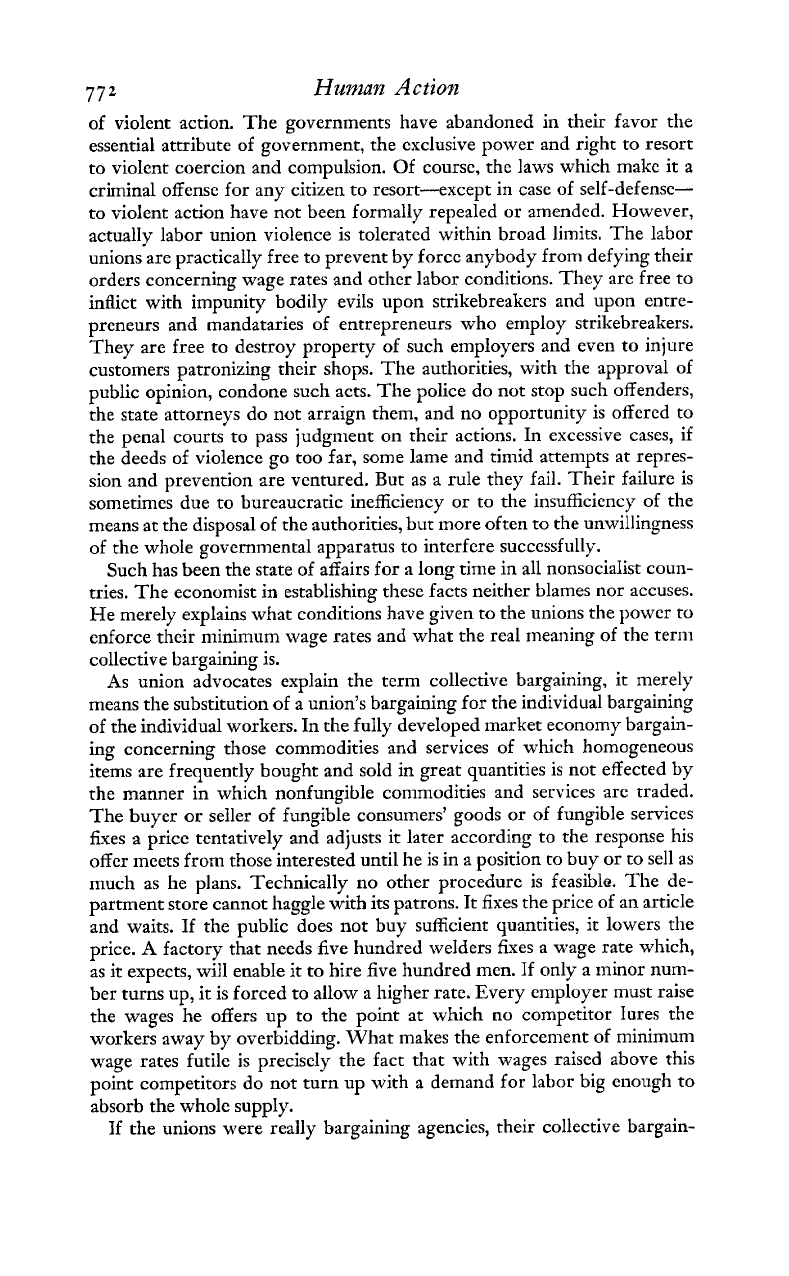
772
Hunzan
Action
of violent action. The governments have abandoned in their favor the
essential attribute of government, the exclusive power and right to resort
to violent coercion and compulsion. Of course, the laws which make it a
criminal offense for any citizen to resort-except in case of self-defense-
to violent action have not been formally repealed or amended. However,
actually labor union violence is tolerated within broad limits. The labor
unions are practically free to prevent by force anybody from defying their
orders concerning wage rates and other labor conditions. They are free to
inflict with impunity bodily evils upon strikebreakers and upon entre-
preneurs and mandataries of entrepreneurs who employ strikebreakers.
They are free to destroy property of such employers and even to injure
customers patronizing their shops. The authorities, with the approval of
public opinion, condone such acts. The police do not stop such offenders,
the state attorneys do not arraign them, and no opportunity is offered to
the penal courts to pass judgment on their actions. In excessive cases, if
the deeds of violence go too far, some lame and tinlid attempts at repres-
sion and prevention are ventured. But as a rule they fail. Their failure is
sometimes due to bureaucratic inefficiency or to the insufficiency of the
means at the disposal of the authorities, but more often to the unwillingness
of the whole governmental apparatus to interfere successfully.
Such has been the state of affairs for a long tirne in all nonsocialist coun-
tries. The economist in establishing these facts neither blames nor accuses.
He merely explains what conditions have given to the unions the power ro
enforce their minimum wage rates and what the real meaning of the term
collective bargaining is.
As union advocates explain the term collective bargaining, it merely
means the substitution of a union's bargaining for the individual bargaining
of the individual workers. In the fully developed market economy bargain-
ing concerning those commodities and services of which homogeneous
items are frequently bought and sold in great quantities is not effected by
the manner in which nonfungible con~modities and services are traded.
The buyer or seller of fungible consumers' goods or of fungible services
fixes
a
price tentatively and adjusts it later according to the response his
offer meets from those interested until he is in a position to buy or to sell as
much as he plans. Technically no other procedure is feasible. The de-
partment store cannot haggle with its patrons. It fixes the price of an article
and waits. If the public does not buy sufficient quantities, it lowers the
price.
A
factory that needs five hundred welders fixes a wage rate which,
as it expects, will enable it to hire five hundred men. If only a minor num-
ber turns up, it is forced to allow a higher rate. Every employer must raise
the wages he offers up to the point at which no competitor Iures the
workers away by overbidding. What makes the enforcement of minimum
wage rates futile is precisely the fact that with wages raised above this
point competitors do not turn up with a demand for labor big enough to
absorb the whole supply.
If the unions were really bargaining agencies, their collective bargain-
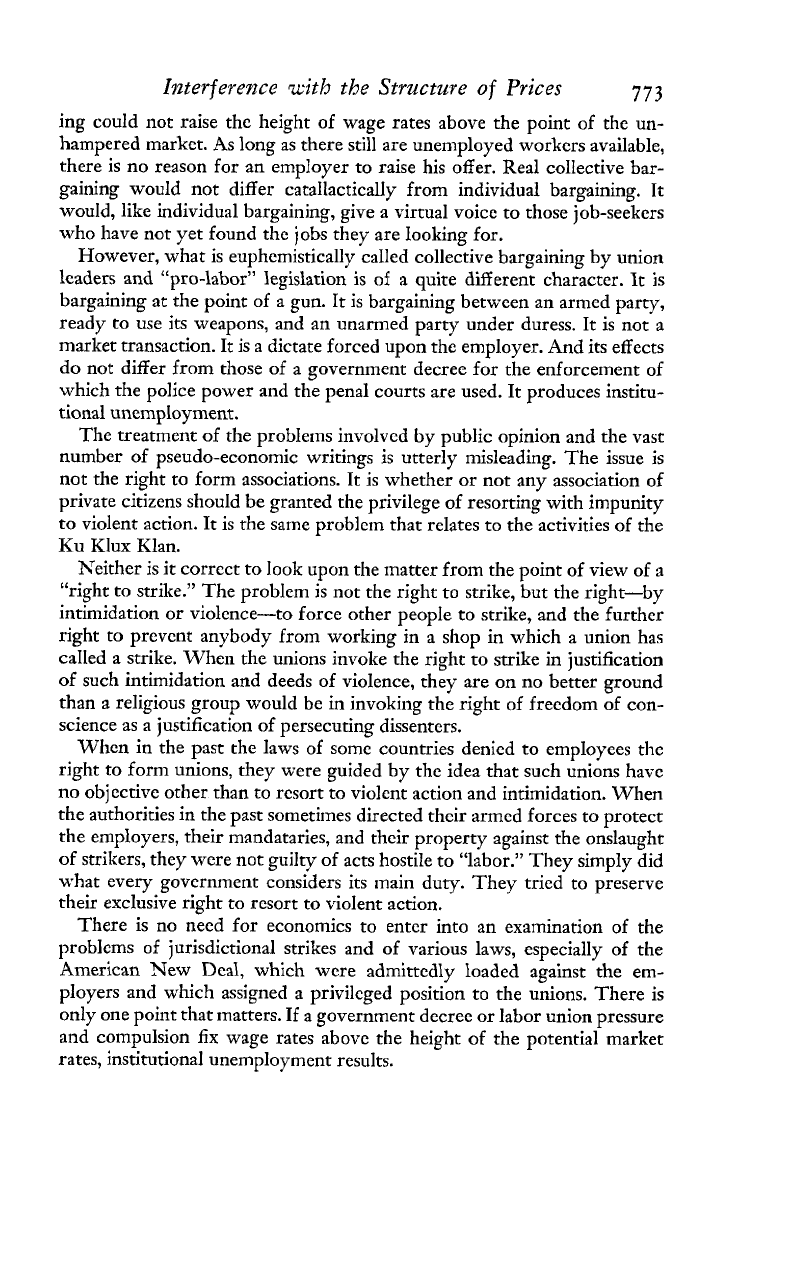
Interference uith the Structure
of
Prices
773
ing could not raise the height of wage rates above the point of the un-
hampered market. As long as there still are unemployed workers available,
there is no reason for an employer to raise his offer. Real collective bar-
gaining would not differ cataIlactically from individual bargaining. It
would, like individual bargaining, give
a
virtual voicc to those job-seekers
who have not yet found the jobs they are Iooking for.
However, what is euphemistically caIled collective bargaining by union
leaders and "pro-labor" legislation is of a quite different character. It is
bargaining at the point of a gun. It is bargaining between an armed party,
ready to use its weapons, and an unarmed party under duress. It is not a
market transaction. It is a dictate forced upon the employer. And its effects
do not differ from those of a government decree for the enforcement of
which the police power and the penal courts are used. It produces institu-
tional unemployment.
The treatment of the problems involved by public opinion and the vast
number of pseudo-economic writings is utterly misleading. The issue is
not the right to form associations. It is whether or not any association of
private citizens should be granted the privilege of resorting with impunity
to violent action. It is the same problem that relates to the activities of the
Ku Klux Klan.
hTeithcr is it correct to look upon the matter from the point of view of a
"right to strike." The problem is not the right to strike, but the right-by
intimidation or violence-to force other people to strike, and the further
right to prevent anybody from working in a shop in which a union has
caIled
a
strike. When the unions invoke the right to strike in justification
of such intimidation and deeds of violence, they are on no better ground
than
a
religious group would be in invoking the right of freedom of con-
science as a justification of persecuting dissenters.
When in the past the laws of some countries denied to employees the
right to form unions, they were guided by the idea that such unions have
no obj cctive other than to resort to violent action and intimidation. When
the authorities in the past sometimes directed their armed forces to protect
the employers, their mandataries, and their property against the onslaught
of strikers, they were not guilty of acts hostile to "labor." They simply did
what every government considers its main duty. They tried to preserve
their exclusive right to rcsort to violent action.
There is no need for economics to enter into an examination of the
problems of jurisdictional strikes and of various laws, especially of the
American New Deal, which wcre admittedly loaded against the em-
ployers and which assigned
a
privileged position to the unions. There is
only one point that matters. If a government decree or labor union pressure
and compulsion fix wage rates above the height of the potential market
rates, institutional unemployment results.
